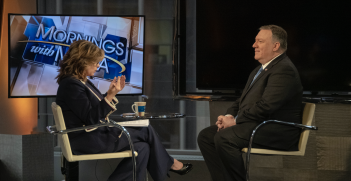Australia-EU Cooperation on Security, Foreign Policy and Development

With the resurgence of Great Power competition in their respective regions, cooperation between the European Union and Australia is more important than ever.
Writing more than 18 months ago for the book which was launched on the occasion of the 2017 EU-Australia Leadership Forum in Sydney, I argued that: “After years of benign neglect Europe is re-emerging with higher priority in Australian thinking on security, foreign policy and development.”
Towards the end of 2018 I would argue that assessment remains true. Indeed, if anything, there is an even sharper set of strategic imperatives that should drive Australia, the EU and European countries closer together.
So what are the factors driving closer cooperation? I count five big strategic risks or problem areas: China, Russia, cyber security, Donald Trump and Western democratic malaise. Interestingly, these risks are wickedly interconnected and they all force the decent democracies of the planet to think harder about how we can protect our interests.
The world is reluctantly coming to the realisation that China isn’t just a massive growth opportunity but also a nationalistic, Leninist, authoritarian state with vast and growing military power and an agenda to remake the world order to suit the agenda of the ruling Chinese Communist Party. The days of Deng’s peaceful rise are over. The challenge is acute for Australia because we have allowed ourselves to become so economically dependent on China that just quibbling about their aspiration for regional dominance seems offensive to some.
But pushback is happening. Parliament has enacted legislation modernising Australia’s espionage laws in ways that may curb China’s covert and at times overt influence operations in domestic politics. There is a stronger political sense that Australia must do more with our Pacific island neighbours and in South-east Asia to counter Beijing’s rapidly growing strategic dominance.
For many Europeans, China is still a long way away and there is perhaps still a tendency to look for economic upsides rather than strategic risk. The problem is that the more one dives into market opportunities the closer one gets to the risk factors. We are already seeing some European countries getting worried about how far Chinese investment should be allowed into critical infrastructure and about how to protect intellectual property. In summary, the EU and Australia have a common interest to better understand China, to share strategies for countering undue influence and, in Australia’s case, to build greater market diversity to reduce China’s dominance in our economy.
Russia’s economy is about the size of Australia’s, but its nuclear capability, rapidly modernising conventional military and an assertive, revanchist foreign policy makes Moscow a strategic threat to Europe and to Western interests more broadly. Russia is a lower priority for Australia but we remain an espionage target and share Europe’s outrage at Russia’s assault on Ukraine, the chemical weapons attack in the UK, and the shootdown of MH-17 in July 2014 among other violations of the international rule of law. The emerging Russia-China connection needs watching as both countries seek to disrupt the global order and to promote a nationalism fuelled authoritarianism.
Russia and China are two key actors behind threats to cyber security, which of course has global reach and are particularly damaging to developed economies. As 5G cellular mobile communications becomes the backbone of the internet of things and, in effect the most critical element of critical infrastructure everywhere, Australia and the EU should ramp up our collaboration on cyber security. Protecting against intellectual property theft is one priority, while a second must be to assure the security of our electoral systems against manipulation in ways that undermine the confidence of voters. A third priority area must be to establish more effective protection for cyber enabled critical infrastructure from being damaged by “malware” – that is to say software bombs deployed by opponents.
Just when the West needed an American President of the calibre of a Roosevelt, Eisenhower or Reagan, we got Donald J Trump! He has become stronger in office and appears bent on undermining so many of the post-war institutions that built European and global stability. I identify Trump as the problem rather than the United States because so much the system (or the swamp as Trump calls it) is intent on keeping America internationally engaged, supporting allies and promoting the global commons. Trump’s arrival means that Australia and Europe and other consequential democracies like Japan and India must work harder to promote our shared security interests – and in effect to be the better burden-sharing allies, that Trump claims to want. Whatever America’s future trajectory, it seems to be that the democracies must do more to promote their own strategic interests, which again makes the Australia-EU connection more relevant.
Finally, there is the democratic malaise sweeping through all our countries; building mistrust in politics and pushing supporters to more extreme political groupings. Australia and the EU should use our shared values to tackle the root causes of the political disaffection that gives rise to weak and distracted governments and disrupters of the Trumpian kind.
When the world gets more risky, the democracies should get closer and that is indeed what’s happening with the Australia-EU connection. The Australia-EU Framework Agreement signed on 7 August 2017 by the then Foreign Minister Julie Bishop and the EU High Representative, Federica Mogherini, has been approved for ratification by the Parliament’s Treaty Committee and should be enacted soon. A web of government to government interactions across a vast array of policy areas points to practical connections between Australian and European politicians, officials, academics and business leaders.
Much more can and should be done to build practical ties in defence, foreign affairs and development cooperation. Surely though an urgent task should be to work more closely to overcome the five big strategic risks and problem areas I have outlined above. The challenge for us all is to do some hard policy thinking about what more Australia, the EU and the consequential democracies can do to strengthen our own defence and security positions in the face of rising authoritarianism, cyber connectivity and democratic drift.
Peter Jennings is the Executive Director of the Australian Strategic Policy Institute and a former deputy secretary for strategy in the Defence Department. Mr Jennings is a member of the EU-Australia Leadership Forum Multi-Stakeholder Steering Committee.
This article was originally published in The EU and Australia: Towards a New Era, the official publication of the EU-Australia Leadership Forum 2018, which took place from 18-22 November. It is republished with permission.
The AIIA is part of the international consortium selected to deliver the EU-Australia Leadership Forum project, a three-year initiative funded by the EU. Click here for video highlights of the forum.





